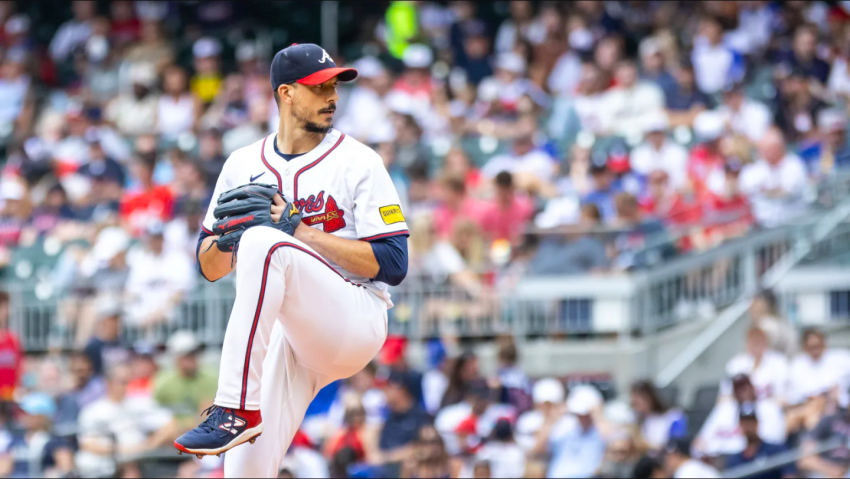The MLB offseason is a time for bold moves and calculated risks, and the Baltimore Orioles made headlines by signing veteran pitcher Charlie Morton to a one-year, $10 million contract. The deal, which marks the end of Morton’s tenure with the Atlanta Braves, has drawn mixed reactions from fans and analysts. ESPN recently graded the Orioles’ decision, highlighting the potential benefits and risks of the signing while also shedding light on what this move means for both the Orioles and the Braves.
Charlie Morton was a key contributor to the Braves’ rotation during his time in Atlanta, known for his consistency, durability, and leadership. Despite being 41 years old, Morton remained a reliable starter in 2024, posting an 8-10 record with a 4.19 ERA over 30 starts. While these numbers represent a slight decline from his peak performance, Morton’s ability to take the ball every fifth day and provide quality innings made him a valuable piece of Atlanta’s pitching staff. Beyond his on-field contributions, Morton was also a respected veteran presence in the clubhouse, mentoring younger pitchers and helping to maintain the Braves’ culture of success.
For the Orioles, the signing of Morton addresses a critical need for stability in their rotation. Baltimore showed promise in 2024 but struggled with inconsistency, particularly among their starting pitchers. Morton’s durability and playoff experience make him an ideal addition to a young team looking to take the next step toward contention. The Orioles are not only banking on Morton’s ability to perform on the mound but also on his leadership and ability to mentor their emerging arms. This signing is as much about developing the team’s future as it is about improving their immediate prospects.
ESPN graded the Orioles’ signing of Morton as a B+, acknowledging the strategic thinking behind the move while also noting its limitations. On the positive side, Morton provides the Orioles with a dependable veteran arm at a reasonable cost. A one-year, $10 million deal minimizes financial risk and ensures that the team is not locked into a long-term commitment. Morton’s experience in high-pressure situations, including multiple postseason runs, adds intangible value to a team that is still learning how to win consistently. Additionally, his durability—having made at least 30 starts in every full season since 2018—offers the Orioles much-needed stability.
However, ESPN also highlighted potential downsides to the deal. At 41, Morton is undeniably in the twilight of his career, and there is always a risk that his performance could decline sharply. While he remains a steady presence, he is unlikely to be a transformative player who significantly alters the Orioles’ trajectory. The B+ grade reflects a belief that while this is a smart, low-risk move for Baltimore, it may not have a major impact on their ability to compete at the highest level.
From the Braves’ perspective, letting Morton walk was a calculated decision based on their confidence in their current pitching depth. Atlanta’s rotation was one of the best in MLB in 2024, led by National League Cy Young Award winner Chris Sale and standout performances from Reynaldo López and Spencer Strider. With such a strong staff, the Braves likely viewed Morton as expendable, especially given his age and the opportunity to allocate resources elsewhere. However, Morton’s departure does raise questions about Atlanta’s depth and leadership. While their top arms are elite, injuries or underperformance could expose a lack of veteran stability in the rotation. Some analysts have argued that retaining Morton for $10 million would have been a small price to pay for the peace of mind his presence provides.
The Orioles and Braves are at different stages in their competitive windows, which influenced their respective decisions regarding Morton. For Baltimore, adding Morton represents an investment in both the present and the future. While his on-field contributions will be important, his mentorship could have lasting benefits for the team’s young pitchers. The Orioles are trying to transition from rebuilding to contending, and Morton provides a bridge to that next phase. For Atlanta, the decision to move on from Morton reflects a focus on maximizing their championship window. The Braves appear confident that their current rotation can sustain its dominance without Morton, allowing them to prioritize financial flexibility and other roster needs.
The success of this deal will ultimately depend on how Morton performs in 2025 and how the Orioles and Braves fare overall. If Morton can replicate his recent performance—providing a 3.80-4.20 ERA over 150-170 innings—Baltimore will have gotten excellent value for their investment. Even if his numbers are modest, Morton’s influence on the Orioles’ young pitchers could pay dividends for years to come. For the Braves, the impact of Morton’s departure will largely hinge on the health and effectiveness of their rotation. If Chris Sale, Reynaldo López, and the rest of Atlanta’s staff remain dominant, the Braves’ decision will likely be validated. However, if injuries or regression strike, Morton’s absence could become a point of contention.
In the broader context of the offseason, the Orioles’ signing of Charlie Morton and the Braves’ decision to let him walk both reflect sound reasoning tailored to each team’s goals. Baltimore gains a veteran leader and innings eater who can help guide their young team, while Atlanta maintains the flexibility to continue building around their elite core. The Orioles’ B+ grade from ESPN underscores the calculated nature of the move—it’s a smart, low-risk bet that aligns with the team’s needs and aspirations. Only time will tell whether this decision helps propel Baltimore toward playoff contention or if Atlanta will miss Morton’s steady presence in their pursuit of another championship. For now, both teams appear poised to move forward with confidence in their respective paths.
